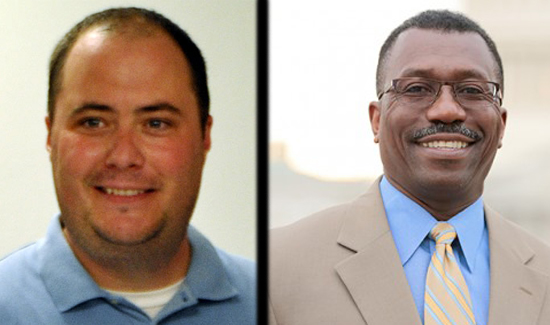DC Police Union Elects New Leadership

Sgt. Matthew Mahl, left, an 11-year veteran, will take over as chairman of the D.C. police officers union starting April 1. Delroy Burton, right, lost his bid for re-election.
New president says members want to heal the relationship between officers and the chief. Anger has been rooted in a six-year impasse in which no raises were given. It ended in 2014 when an arbiter ruled for the city, granting raises but rejecting the union’s bid to make them retroactive to 2009.
From The Washington Post:
D.C. officers oust union leader; new chairman vows to work with Lanier
By Peter HermannD.C. police officers have overwhelmingly voted to oust the chairman of their union in a surprise move that the incoming leader said could end the group’s fractured relationship with the District’s police chief and mayor.Sgt. Matthew Mahl, an 11-year veteran, will take over from Delroy Burton starting April 1.Mahl, a former supervisor in the Gay and Lesbian Liaison Unit and currently assigned to the 6th Police District, won Tuesday’s vote by a nearly 2-to-1 ratio. Two others on Burton’s slate, the vice chair and secretary, also lost.
Burton, a sergeant, had been at the union’s helm for just one year, but he had been involved in the collective bargaining organization since 2006. He set a softer tone than that of his predecessor, Kristopher Baumann, who held the spot for eight years, but Burton was cast as a continuation of the old regime that administration officials regarded as obstructionist.“The current union leaders are always attacking the chief and the city,” Mahl said Wednesday. “The police union and the city have the same goals. We want happy and safe police officers and we want happy and safe communities. We can’t keep punching the police leaders in the face all the time.”
The union — which represents about 3,500 sworn officers, detectives and sergeants — supported one of Mayor Muriel E. Bowser’s chief rivals in the election, and repeatedly attacked Chief Cathy L. Lanier’s crime-fighting strategies and personnel moves. The group argued that Lanier’s management style and decisions crippled efforts to reduce violence and were directly responsible for hundreds of officers who left the force as homicides surged last year.
The two sides often argued over crime statistics and whether the District was safe, creating an atmosphere of uncertainty over whether police were effectively fighting crime as the city continued to grow.
“We want to work with whomever to make the District safer and stronger,” said the mayor’s chief spokesman, Michael Czin, echoing one of Bowser’s talking points. “The police union can be a partner in that.”Lanier said Wednesday that Mahl has a “different personality” from those who previously held the post. “I love the idea that the chairman is saying everything is not a fight, and everything doesn’t have to be adversarial,” she said.
Lanier said she heard concerns from residents confused by the opposing crime messages from her department and the union, and that one person told her she was tired of the labor group’s “fear mongering.” She called Mahl “a real cop, a street officer,” and said, “I love the fact that the person fighting for the working police officer is a working police officer.”
Burton said he believed that the vote was more about internal union issues than the relationship with Bowser (D) and Lanier, and that many disagreements between the union and the city were over pay and work conditions. Last year, Burton held an unofficial survey in which union members voted no confidence in the chief.
“There are a lot of disgruntled people in the police department, and even though we are successful on a lot of things, they don’t see those successes translated into their pockets,” Burton said. “They blame the union and the union leadership.”
Anger has been rooted in a six-year impasse in which no raises were given. It ended in 2014 when an arbiter ruled for the city, granting raises but rejecting the union’s bid to make them retroactive to 2009.
Mahl said he wants to reach out to young officers to persuade them to stay and help offset attrition rates, and work out differences over a table rather than in a courtroom.
“We tie up taxpayer money and union resources in battles we don’t have to be in,” Mahl said. “We want to go back to a time when everyone can sit together in a room and work things out.”














